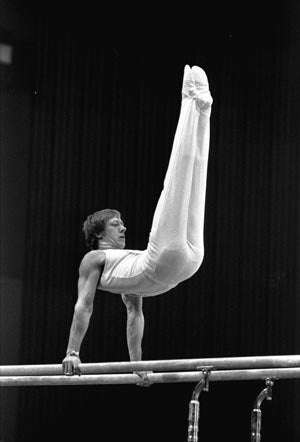Nikolai Andrianov: Gymnast who became the second most decorated male athlete in Olympic history

Nikolai Andrianov was Russia's most decorated male gymnast and the second most decorated male athlete in Olympic history, winning 15 Olympic medals as well as 12 World Championship and 18 European Championship medals, an unsurpassed medal count.
In all, he won 20 Olympic, World and European titles, as well as seven World Cups. His total of 15 Olympic medals was the record for men until the American swimmer Michael Phelps surpassed him at the 2008 Beijing Olympics. Overall, the record is held by another Russian gymnast, Larissa Latynina, who won 18 medals in 1956, 1960 and 1964.
Coming from an impoverished background, Andrianov harnessed his strong personality and sacrificed much to climb to the top of his sport, a feat he believed saved his life. Though few knew, he did it while also enjoying cigarettes and vodka. Though physically and technically gifted, he was also known for his courage and as one of the toughest competitors in the sport. He often pushed other gymnasts to match his feats, such as attempting triple-back flip dismounts from the rings when everyone else was doing doubles.
One of four children, Nikolai Yefimovich Andrianov was born in Vladimir, about 200 kilometres east of Moscow in 1952; abandoned by their father, they were raised by their mother. Andrianov often played truant, and when he was in school he could be disruptive; he was heading for trouble until gymnastics "saved" him.
He came to the sport relatively late, aged 12, after a friend convinced him to give it a try. He entered the Children and Youth Sports School of the famed Burevestnik Sports Society in his home town. However, he quit soon after, as he was the oldest boy among the beginners. Impressed by the little he had seen, the renowned coach Nikolai Tolkachyov tracked him down and persuaded him to return, coaching him and helping him catch up with his school work.
Andrianov learned quickly and in 1969, aged 17, made the USSR youth team. In 1970, he earned a place on the Soviet national team and won his first six medals in international competition, including two golds, in pommel horse and vault, at the 1971 European Championships in Madrid. The following year, he won the title of all-round Soviet champion. The 1972 Olympics saw Andrianov, immensely powerful in the upper body, make his mark, winning the floor competition and taking team silver as well as a bronze in the vault. Arguably his finest hour came four years later in Montreal, when he won seven medals, including gold in the floor exercises, rings and vault, and the all-around title.
In Moscow in 1980, as representative of the hosts, Andrianov was given the honour of taking the Olympic Oath on behalf of his fellow athletes. He went on to win five more medals, including golds in the vault and the team competition.
In retirement, Andrianov continued to dedicate himself to gymnastics, as well as his family – he had married the double Olympic gymnastics champion Lyubov Burda in 1973. From 1981-92 he was head coach of the Soviet junior men's team, his star pupil Vitaly Scherbo, who won six out of eight possible golds in Barcelona in 1992, the greatest performance by a gymnast at a single Games. Andrianov went on to judge internationally and, in 1990 was elected president of the Soviet Gymnastics Federation.
Scherbo, who now runs a gymnastics school in Los Angeles, recalled Andrianov getting him re-instated into the national team after he had been suspended. "He was my mentor," he said. "He taught me how to concentrate, to keep myself inside myself.."
Following the break-up of the Soviet Union in 1991, Andrianov accepted an invitation in 1994 from his friend and former rival Mitsuo Tsukahara to coach in Japan. One of the gymnasts he coached was Tsukahara's son Naoya, who helped lead Japan to team gold at the 2004 Athens Olympics.
Andrianov returned to Vladimir in 2002 to coach at the gym where he had started out. Among his protégés was the future Olympian Yuri Ryazanov, who was killed in a car accident in October 2009, days after winning all-round bronze at the world championships in London. By then Andrianov was suffering from multiple system astrophy (MSA), a rare neurological disorder similar to Parkinson's Disease. He became severely disabled, confined to bed and unable to move his limbs or talk, as the disease slowly paralysed him.
Nikolai Yefimovich Andrianov, gymnast; born Vladimir, Russia 14 October 1952; married 1973 Lyubov Burda (two sons); died Vladimir 21 March 2011.
Subscribe to Independent Premium to bookmark this article
Want to bookmark your favourite articles and stories to read or reference later? Start your Independent Premium subscription today.

Join our commenting forum
Join thought-provoking conversations, follow other Independent readers and see their replies